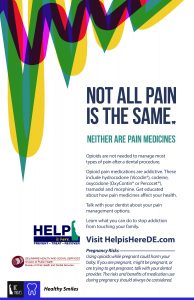NEW CASTLE (Oct. 15, 2018) – Department of Health and Social Services (DHSS) Secretary Dr. Kara Odom Walker, a board-certified family physician, has been elected as a member of the prestigious National Academy of Medicine (NAM), Academy President Victor Dzau announced today during the organization’s annual meeting in Washington.
 Secretary Walker is one of 75 new members this year from across the country and 10 international members. Membership in the National Academy of Medicine is considered one of the highest honors in the fields of health and medicine, and recognizes individuals who have demonstrated outstanding professional achievements and commitment to service.
Secretary Walker is one of 75 new members this year from across the country and 10 international members. Membership in the National Academy of Medicine is considered one of the highest honors in the fields of health and medicine, and recognizes individuals who have demonstrated outstanding professional achievements and commitment to service.
“I congratulate Dr. Walker on being elected to the National Academy of Medicine,” Governor John Carney said. “Dr. Walker uses her problem-solving, outreach and leadership skills to take on such complex issues in our
state as the opioid epidemic and the rising growth in health care spending. She doesn’t back way from these issues. She leans in, bringing people together, using data and other resources to assess situations, and changing systems to better serve the people of our state.”
Secretary Walker was sworn in as Cabinet Secretary for DHSS in February 2017, leading the principal agency charged with keeping Delawareans healthy, ensuring they get the health care they need in a fast-changing world, and providing children, families and seniors with essential social services including food benefits, disability-related services, and mental health and addiction treatment. She oversees one of the largest departments in Delaware’s government with an annual budget of more than $2 billion. As Cabinet Secretary, her priorities include:
• Slowing the growth of health care spending, increasing the transparency of health care costs and improving patient outcomes.
• Bolstering the state’s response to the opioid epidemic with increased resources for treatment, harm reduction and prevention.
• Reducing gun violence in Wilmington by meeting the social services needs of high-risk young people and their families.
• Maintaining a strong safety net for those in need.
• Providing more community-based services for seniors, people with disabilities and individuals who are homeless.
Prior to being nominated to head DHSS by Governor Carney, Secretary Walker worked as the Deputy Chief Science Officer at the Patient-Centered Outcomes Research Institute (PCORI), a nonprofit, nongovernment organization in Washington that is authorized by Congress to improve evidence available to help patients, caregivers, employers, insurers and policymakers make informed health care decisions. She managed the Institute’s research investments, which totaled $1.6 billion in 2016, toward a planned total of $2.5 billion by 2019.
“Those of us who had the great pleasure to work with Kara during her four and a half years at PCORI are thrilled with her well-earned election to the National Academy of Medicine,” said Joe V. Selby, MD, MPH, Executive Director of the Patient-Centered Outcomes Research Institute. “It recognizes the diligent work and exceptional contributions she’s made at every stop throughout her training and career. She brings tremendous knowledge and insight to the Academy as it pursues its mission of improving health for all.”
Background in teaching, serving
Secretary Walker formerly taught Family and Community Medicine at the University of California, San Francisco, as an Assistant Clinical Professor, and has worked with several national organizations to advocate for health equity and for access to quality health care in minority and underserved populations, including the National Medical Association, the Student National Medical Association and the American Medical Association. Dr. Walker has been recognized for leadership by Harvard Business School’s Program for Leadership Development, the American Medical Association and the National Medical Association.
Kevin Grumbach, MD, the Hellman Endowed Professor and Chair of the University of California, San Francisco (UCSF) Department of Family and Community Medicine, nominated Dr. Walker for the honor. “Dr. Walker’s election to the National Academy of Medicine recognizes her career-spanning roles as a family physician and community health leader in academic medicine, the Patient-Centered Outcomes Research Institute, and state government who has championed health equity and consumer and community engagement,” Dr. Grumbach said. “In her current role as Cabinet Secretary at the Delaware Department of Health and Social Services, she has addressed social determinants of health by making Delaware a state with one of the highest percentages of eligible families enrolled in the Supplemental Nutritional Assistance Program and fathers paying child support, and by launching new community-based violence prevention programs. She has rapidly emerged as one of her generation’s most influential family physicians.”
A Caravel Academy high school graduate, she earned her bachelor’s degree in chemical engineering from the University of Delaware and her medical degree from Jefferson Medical College in Philadelphia. She has a Masters of Public Health from the Johns Hopkins School of Public Health and a Masters in Health Services Research from the University of California, Los Angeles, School of Public Health, where she also completed a post-graduate fellowship in the Robert Wood Johnson Clinical Scholars program. As a family physician, Dr. Walker has provided direct patient care in many primary care settings, including those for uninsured and underserved populations. She has published research papers on physician workforce issues, health care organization and delivery.
“The College of Engineering at the University of Delaware would like to congratulate Dr. Walker for her well-deserved election to the National Academy of Medicine,” said Levi T. Thompson, Dean of UD’s College of Engineering and an alumnus of UD’s chemical engineering program. “Her studies in chemical engineering at UD were the starting point of an educational journey that prepared her well to tackle grand challenges in health and public policy. Now, she is using her skills and knowledge to improve the health, safety and quality of life for people in Delaware and across the nation. We could not be more proud of Dr. Walker and look forward to her continued successes.”
The National Academy of Medicine, established in 1970 as the Institute of Medicine, is an independent organization of eminent professionals from diverse fields, including health and medicine; the natural, social and behavioral sciences; and beyond. It serves alongside the National Academy of Sciences and the National Academy of Engineering as an adviser to the nation and the international community. Through its domestic and global initiatives, the Academy works to address critical issues in health, medicine and related policy, and inspire positive action across sectors.
-30-
The Department of Health and Social Services is committed to improving the quality of life of Delaware’s citizens by promoting health and well-being, fostering self-sufficiency, and protecting vulnerable populations.

 Secretary Walker is one of 75 new members this year from across the country and 10 international members. Membership in the National Academy of Medicine is considered one of the highest honors in the fields of health and medicine, and recognizes individuals who have demonstrated outstanding professional achievements and commitment to service.
Secretary Walker is one of 75 new members this year from across the country and 10 international members. Membership in the National Academy of Medicine is considered one of the highest honors in the fields of health and medicine, and recognizes individuals who have demonstrated outstanding professional achievements and commitment to service.